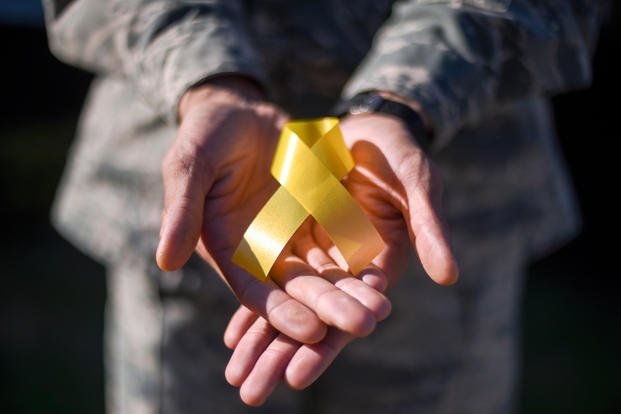I wish I had realized, before my son’s attempt on his life, that his abrupt change in behavior was actually an indication that something else was going on.
I’ll be the first to admit that it was easier to dismiss what seemed to be “typical” teen behaviors rather than recognize them as the first sign of a more serious issue. And I wish I were an anomaly.
According to a recent study published in the Journal of Adolescent Health, our dependent teens have an increased risk of mental health issues compared to those who do not have a parent or sibling in the military. (Read more about the study.)
It is not surprising really, as our milkids have to deal with so many more challenges than the typical civilian teenager.
But how do we know if a teen’s rebellious behaviors are actually indications of depression or suicidal ideation as opposed to what many refer to as teenage “growing pains?”
If you or someone you know is thinking about suicide, please call the National Suicide and Crisis Lifeline at 988.
Sadly, more and more often I’m discovering that my family is not alone in dealing with the residual effects brought on by years at war. The fact is that depression in teen military dependents is on the rise, and frankly it’s time we tackled the problem head on before it gets any worse.
As military spouses, we are taught to watch for signs in our servicemembers when it comes to mental health issues, but not so when it comes to our children.
If we are honest with ourselves, we know that many of our children are experiencing the effects of this war in ways we can only begin to understand. The research shows that more than a quarter of them are having difficulties.
So what can we do? The complete and long-term answer is multi-dimensional and complex, but there is a simple response that can become a steppingstone toward effective change.
In order for us to help our children, we need to do two things:
1. We need to educate the military community on the ways to identify at risk youth.
2. We must do whatever it takes to ensure that our children have access to the treatment they need to heal.
You may be surprised to learn that in teens, depression looks very different than it does in an adult. According to Helpguide.org, the following symptoms are common in teens suffering from depression but are often dismissed as typical teen behaviors -- causing their condition to go undiagnosed. A teen may display any or all of the following:
- Irritable or angry mood -- Irritability, rather than sadness, is often the predominant mood in depressed teens. A depressed teenager may be grumpy, hostile, easily frustrated, or prone to angry outbursts.
- Unexplained aches and pains -- Depressed teens frequently complain about physical ailments such as headaches or stomach aches. If a thorough physical exam does not reveal a medical cause, these aches and pains may indicate depression.
- Extreme sensitivity to criticism -- Depressed teens are plagued by feelings of worthlessness, making them extremely vulnerable to criticism, rejection and failure. This is a particular problem for “over-achievers.”
- Withdrawing from some, but not all people -- While adults tend to isolate themselves when depressed, teenagers usually keep up at least some friendships. However, teens with depression may socialize less than before, pull away from their parents, or start hanging out with a different crowd.
So what can we do when we suspect our child is dealing with something more serious than a simple case of “teenager-itis”?
The best answer is to get them to a specialist, someone skilled at working with teens, as soon as possible.
When it comes to depression and other similar behavioral health issues, it is important to err on the side of caution and get an expert opinion from a doctor who can diagnose what is going on and coordinate the necessary treatment.
Depression isn’t something that your child will outgrow, nor is it something that they will be able to “soldier-on” through. Depression is a serious condition that needs treatment as soon as one suspects that their child may be experiencing difficulty.
From experience, I can tell you that one of the reasons that my son is still with us today is because we never brushed aside his struggles with dealing with military life. We addressed things head on and got him to a specialist the moment his behavior began to change.
While it didn’t prevent his choice to self-medicate with prescription meds and alcohol, it did open a line of communication and understanding that allowed him to reach out to us when things became too much for him to handle.
As parents, the best way to help our military teens is to keep talking (not lecturing), keep listening (not judging) and keep interested and involved in their lives.
Understand that they grow up quickly as military kids and they deal with situations far beyond their years. As adults, it’s up to us to show them unconditional love and understanding while being willing to take the steps necessary to get them the help they need should circumstances arise.
I believe we can begin to change this horrific trend by making sure that every military child knows that they are not alone in their journey through the challenges and changes of military life. We can show them that as a community we see their struggles and are here to help. And we can make a difference one child at a time…
Motivational speaker, author and blogger Judy Davis has a passion for inspiring military spouses to become stronger and more resilient using her powerful "One Moment at a Time" philosophy. Read her blog at http://thedirectiondiva.com/.
Keep Up with the Ins and Outs of Military Life
For the latest military news and tips on military family benefits and more, subscribe to Military.com and have the information you need delivered directly to your inbox.



























